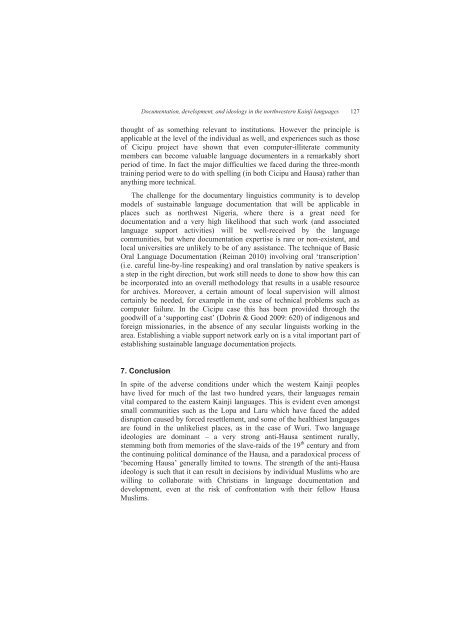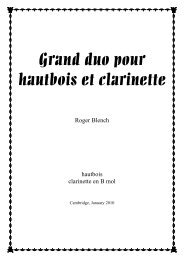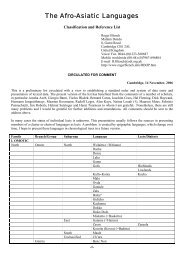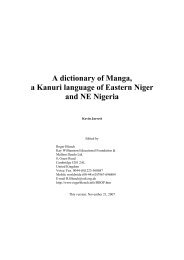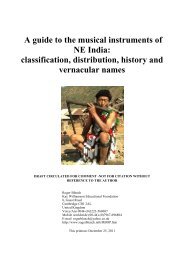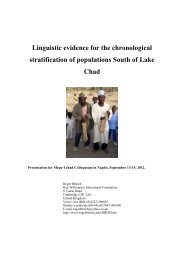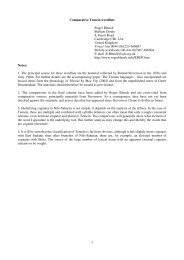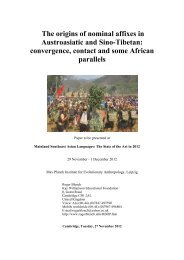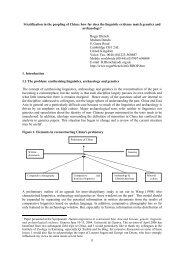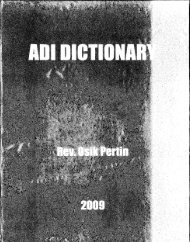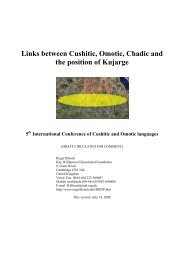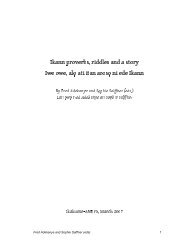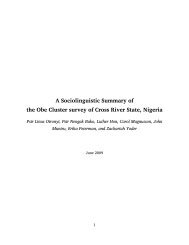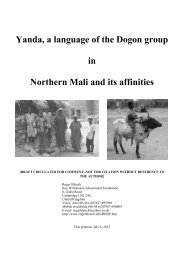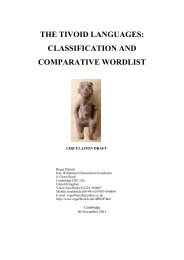Documentation, development, and ideology in the ... - Roger Blench
Documentation, development, and ideology in the ... - Roger Blench
Documentation, development, and ideology in the ... - Roger Blench
You also want an ePaper? Increase the reach of your titles
YUMPU automatically turns print PDFs into web optimized ePapers that Google loves.
<strong>Documentation</strong>, <strong>development</strong>, <strong>and</strong> <strong>ideology</strong> <strong>in</strong> <strong>the</strong> northwestern Ka<strong>in</strong>ji languages 127<br />
thought of as someth<strong>in</strong>g relevant to <strong>in</strong>stitutions. However <strong>the</strong> pr<strong>in</strong>ciple is<br />
applicable at <strong>the</strong> level of <strong>the</strong> <strong>in</strong>dividual as well, <strong>and</strong> experiences such as those<br />
of Cicipu project have shown that even computer-illiterate community<br />
members can become valuable language documenters <strong>in</strong> a remarkably short<br />
period of time. In fact <strong>the</strong> major difficulties we faced dur<strong>in</strong>g <strong>the</strong> three-month<br />
tra<strong>in</strong><strong>in</strong>g period were to do with spell<strong>in</strong>g (<strong>in</strong> both Cicipu <strong>and</strong> Hausa) ra<strong>the</strong>r than<br />
anyth<strong>in</strong>g more technical.<br />
The challenge for <strong>the</strong> documentary l<strong>in</strong>guistics community is to develop<br />
models of susta<strong>in</strong>able language documentation that will be applicable <strong>in</strong><br />
places such as northwest Nigeria, where <strong>the</strong>re is a great need for<br />
documentation <strong>and</strong> a very high likelihood that such work (<strong>and</strong> associated<br />
language support activities) will be well-received by <strong>the</strong> language<br />
communities, but where documentation expertise is rare or non-existent, <strong>and</strong><br />
local universities are unlikely to be of any assistance. The technique of Basic<br />
Oral Language <strong>Documentation</strong> (Reiman 2010) <strong>in</strong>volv<strong>in</strong>g oral ‘transcription’<br />
(i.e. careful l<strong>in</strong>e-by-l<strong>in</strong>e respeak<strong>in</strong>g) <strong>and</strong> oral translation by native speakers is<br />
a step <strong>in</strong> <strong>the</strong> right direction, but work still needs to done to show how this can<br />
be <strong>in</strong>corporated <strong>in</strong>to an overall methodology that results <strong>in</strong> a usable resource<br />
for archives. Moreover, a certa<strong>in</strong> amount of local supervision will almost<br />
certa<strong>in</strong>ly be needed, for example <strong>in</strong> <strong>the</strong> case of technical problems such as<br />
computer failure. In <strong>the</strong> Cicipu case this has been provided through <strong>the</strong><br />
goodwill of a ‘support<strong>in</strong>g cast’ (Dobr<strong>in</strong> & Good 2009: 620) of <strong>in</strong>digenous <strong>and</strong><br />
foreign missionaries, <strong>in</strong> <strong>the</strong> absence of any secular l<strong>in</strong>guists work<strong>in</strong>g <strong>in</strong> <strong>the</strong><br />
area. Establish<strong>in</strong>g a viable support network early on is a vital important part of<br />
establish<strong>in</strong>g susta<strong>in</strong>able language documentation projects.<br />
7. Conclusion<br />
In spite of <strong>the</strong> adverse conditions under which <strong>the</strong> western Ka<strong>in</strong>ji peoples<br />
have lived for much of <strong>the</strong> last two hundred years, <strong>the</strong>ir languages rema<strong>in</strong><br />
vital compared to <strong>the</strong> eastern Ka<strong>in</strong>ji languages. This is evident even amongst<br />
small communities such as <strong>the</strong> Lopa <strong>and</strong> Laru which have faced <strong>the</strong> added<br />
disruption caused by forced resettlement, <strong>and</strong> some of <strong>the</strong> healthiest languages<br />
are found <strong>in</strong> <strong>the</strong> unlikeliest places, as <strong>in</strong> <strong>the</strong> case of Wuri. Two language<br />
ideologies are dom<strong>in</strong>ant – a very strong anti-Hausa sentiment rurally,<br />
stemm<strong>in</strong>g both from memories of <strong>the</strong> slave-raids of <strong>the</strong> 19 th century <strong>and</strong> from<br />
<strong>the</strong> cont<strong>in</strong>u<strong>in</strong>g political dom<strong>in</strong>ance of <strong>the</strong> Hausa, <strong>and</strong> a paradoxical process of<br />
‘becom<strong>in</strong>g Hausa’ generally limited to towns. The strength of <strong>the</strong> anti-Hausa<br />
<strong>ideology</strong> is such that it can result <strong>in</strong> decisions by <strong>in</strong>dividual Muslims who are<br />
will<strong>in</strong>g to collaborate with Christians <strong>in</strong> language documentation <strong>and</strong><br />
<strong>development</strong>, even at <strong>the</strong> risk of confrontation with <strong>the</strong>ir fellow Hausa<br />
Muslims.


